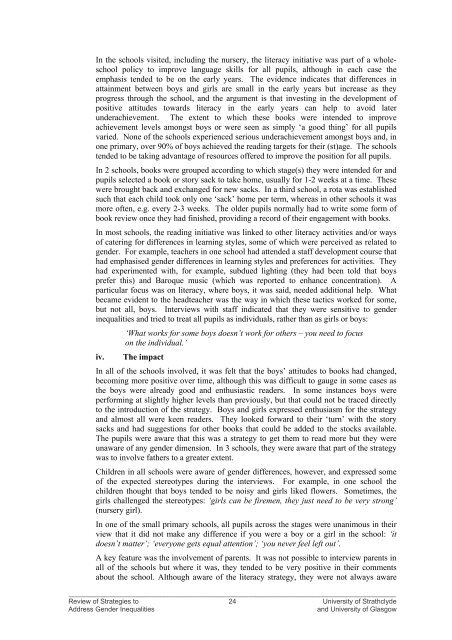Review of Strategies to Address Gender Inequalities in Scottish ...
Review of Strategies to Address Gender Inequalities in Scottish ...
Review of Strategies to Address Gender Inequalities in Scottish ...
Create successful ePaper yourself
Turn your PDF publications into a flip-book with our unique Google optimized e-Paper software.
In the schools visited, <strong>in</strong>clud<strong>in</strong>g the nursery, the literacy <strong>in</strong>itiative was part <strong>of</strong> a wholeschoolpolicy <strong>to</strong> improve language skills for all pupils, although <strong>in</strong> each case theemphasis tended <strong>to</strong> be on the early years. The evidence <strong>in</strong>dicates that differences <strong>in</strong>atta<strong>in</strong>ment between boys and girls are small <strong>in</strong> the early years but <strong>in</strong>crease as theyprogress through the school, and the argument is that <strong>in</strong>vest<strong>in</strong>g <strong>in</strong> the development <strong>of</strong>positive attitudes <strong>to</strong>wards literacy <strong>in</strong> the early years can help <strong>to</strong> avoid laterunderachievement. The extent <strong>to</strong> which these books were <strong>in</strong>tended <strong>to</strong> improveachievement levels amongst boys or were seen as simply ‘a good th<strong>in</strong>g’ for all pupilsvaried. None <strong>of</strong> the schools experienced serious underachievement amongst boys and, <strong>in</strong>one primary, over 90% <strong>of</strong> boys achieved the read<strong>in</strong>g targets for their (st)age. The schoolstended <strong>to</strong> be tak<strong>in</strong>g advantage <strong>of</strong> resources <strong>of</strong>fered <strong>to</strong> improve the position for all pupils.In 2 schools, books were grouped accord<strong>in</strong>g <strong>to</strong> which stage(s) they were <strong>in</strong>tended for andpupils selected a book or s<strong>to</strong>ry sack <strong>to</strong> take home, usually for 1-2 weeks at a time. Thesewere brought back and exchanged for new sacks. In a third school, a rota was establishedsuch that each child <strong>to</strong>ok only one ‘sack’ home per term, whereas <strong>in</strong> other schools it wasmore <strong>of</strong>ten, e.g. every 2-3 weeks. The older pupils normally had <strong>to</strong> write some form <strong>of</strong>book review once they had f<strong>in</strong>ished, provid<strong>in</strong>g a record <strong>of</strong> their engagement with books.In most schools, the read<strong>in</strong>g <strong>in</strong>itiative was l<strong>in</strong>ked <strong>to</strong> other literacy activities and/or ways<strong>of</strong> cater<strong>in</strong>g for differences <strong>in</strong> learn<strong>in</strong>g styles, some <strong>of</strong> which were perceived as related <strong>to</strong>gender. For example, teachers <strong>in</strong> one school had attended a staff development course thathad emphasised gender differences <strong>in</strong> learn<strong>in</strong>g styles and preferences for activities. Theyhad experimented with, for example, subdued light<strong>in</strong>g (they had been <strong>to</strong>ld that boysprefer this) and Baroque music (which was reported <strong>to</strong> enhance concentration). Aparticular focus was on literacy, where boys, it was said, needed additional help. Whatbecame evident <strong>to</strong> the headteacher was the way <strong>in</strong> which these tactics worked for some,but not all, boys. Interviews with staff <strong>in</strong>dicated that they were sensitive <strong>to</strong> gender<strong>in</strong>equalities and tried <strong>to</strong> treat all pupils as <strong>in</strong>dividuals, rather than as girls or boys:‘What works for some boys doesn’t work for others – you need <strong>to</strong> focuson the <strong>in</strong>dividual.’iv. The impactIn all <strong>of</strong> the schools <strong>in</strong>volved, it was felt that the boys’ attitudes <strong>to</strong> books had changed,becom<strong>in</strong>g more positive over time, although this was difficult <strong>to</strong> gauge <strong>in</strong> some cases asthe boys were already good and enthusiastic readers. In some <strong>in</strong>stances boys wereperform<strong>in</strong>g at slightly higher levels than previously, but that could not be traced directly<strong>to</strong> the <strong>in</strong>troduction <strong>of</strong> the strategy. Boys and girls expressed enthusiasm for the strategyand almost all were keen readers. They looked forward <strong>to</strong> their ‘turn’ with the s<strong>to</strong>rysacks and had suggestions for other books that could be added <strong>to</strong> the s<strong>to</strong>cks available.The pupils were aware that this was a strategy <strong>to</strong> get them <strong>to</strong> read more but they wereunaware <strong>of</strong> any gender dimension. In 3 schools, they were aware that part <strong>of</strong> the strategywas <strong>to</strong> <strong>in</strong>volve fathers <strong>to</strong> a greater extent.Children <strong>in</strong> all schools were aware <strong>of</strong> gender differences, however, and expressed some<strong>of</strong> the expected stereotypes dur<strong>in</strong>g the <strong>in</strong>terviews. For example, <strong>in</strong> one school thechildren thought that boys tended <strong>to</strong> be noisy and girls liked flowers. Sometimes, thegirls challenged the stereotypes: ‘girls can be firemen, they just need <strong>to</strong> be very strong’(nursery girl).In one <strong>of</strong> the small primary schools, all pupils across the stages were unanimous <strong>in</strong> theirview that it did not make any difference if you were a boy or a girl <strong>in</strong> the school: ‘itdoesn’t matter’; ‘everyone gets equal attention’; ‘you never feel left out’.A key feature was the <strong>in</strong>volvement <strong>of</strong> parents. It was not possible <strong>to</strong> <strong>in</strong>terview parents <strong>in</strong>all <strong>of</strong> the schools but where it was, they tended <strong>to</strong> be very positive <strong>in</strong> their commentsabout the school. Although aware <strong>of</strong> the literacy strategy, they were not always aware______________________________________________________________________________________<strong>Review</strong> <strong>of</strong> <strong>Strategies</strong> <strong>to</strong> 24 University <strong>of</strong> Strathclyde<strong>Address</strong> <strong>Gender</strong> <strong>Inequalities</strong>and University <strong>of</strong> Glasgow
















